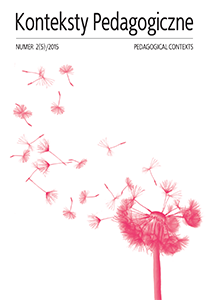Abstrakt
Wrażliwość to zdolność odbioru subtelnych odczuć i emocji. Ta typowo ludzka cecha może rozwijać się pod wpływem doświadczeń z ludźmi i kontaktów z przyrodą. Specyficznymi kontaktami są kontakty ze sztuką. Szcze-gólnym okresem wrażliwości jest dzieciństwo. Wtedy kształtuje się nie tylko świadomy odbiór, ale i ocena estetyczna. Estetyka dziecięca porządkuje wiedzę i zdobywane doświadczenie według prostych schematów. Dla dzieci to, co dobre, jest ładne, i odwrotnie. Stopniowo poprzez poznawanie i rozumienie budują one zręby osobistych preferencji. Subiektywne rozpoznawanie i odczuwanie wartości etycznych i estetycznych buduje i porządkuje świat tak, by był dla dziecka zro-zumiały na aktualnym poziomie jego rozwoju. Jeśli warunki sprzyjają, zdolności odbioru estetycznego rozwijają się, jeśli nie, zaprzepaszczone zostają potencjalne możliwości. Uwrażliwienie jest sposobem przygotowania do krytycznej interpre-tacji działalności człowieka w aspekcie kultury i natury.
Bibliografia
Berger P., Luckmann T., Społeczne tworzenie rzeczywistości, przeł. J. Niżnik, Warszawa 1983.
Bernstein B., Odtwarzanie kultury, przeł. Z. Bokszański, A. Piotrowski, Warszawa 1990.
Boyd D., Bee H., Psychologia rozwoju człowieka, przeł. J. Gilewicz, A Wojciechowski, Poznań 2008.
Czerepaniak-Walczak M., Aspekty i źródła profesjonalnej refleksji nauczyciela, Toruń 1997.
Ferenz K., Znaczenia bodźców estetycznych w budowaniu kompetencji komunikacyjnej, [w:] Estetyka, sztuka, media. Przestrzenie i konteksty pedagogiczne, red. M. Jabłońska, Wrocław 2008.
Gołaszewska M., Zarys estetyki. Problematyka, metody, teorie, Warszawa 1984.
Górniewicz J., Wstęp do pedagogicznej analizy problematyki wyobraźni: (główne stanowiska, idea wyobraźni moralnej, kształcenie), Toruń 1991.
Ingarden R., Studia z estetyki, t. 1, Warszawa 1980.
Ingarden R., Wykłady i dyskusje z estetyki, Warszawa 1981.
Jabłońska M., Nieprzejrzystość estetyczna światów dziecięcych, [w:] Estetyka, sztuka, media. Przestrzenie i konteksty pedagogiczne, red. M. Jabłońska, Wrocław 2008.
Jabłońska M., Malinowska J., Artistic and environmental education in the perspective of sustainable development, [w:] Art in education and therapy, ed. M. Furmanowska, Wrocław 2014.
Jahoda G., Psychologia przesądu, przeł. J. Jedlicki, Warszawa 1971.
Jankowski D., Wartości – aktywność artystyczna – paradygmaty działalności kulturalnej, [w:] Edukacja kulturalna i aktywność artystyczna, red. D. Jankowski, Poznań 1996.
Klus-Stańska D., Światy dziecięcych znaczeń – poszukiwanie kontekstów teoretycznych, [w:] Światy dziecięcych znaczeń, red. D. Klus-Stańska, Warszawa 2004.
Kurowicki J., Piękno i poznanie. Studium kategorii estetyki jako filozofii kultury, Opole 1992.
Losiak R., O współczesnej praktyce odbioru muzyki w perspektywie doświadczenia estetycznego, [w:] Estetyka, sztuka, media. Przestrzenie i konteksty pedagogiczne, red. M. Jabłońska,Wrocław 2008.
Ładyżyński A., Niedoceniony w wychowaniu dziecka – świat uczuć, [w:] Dziecko z zaburzeniami w rozwoju. Konteksty diagnostyczne i terapeutyczne, red. B. Cytowska i B. Winczura, Kraków 2005.
Szuścik U., Obraz dziecka w jego twórczości plastycznej, [w:] Homo Communicus. Szkice pedagogiczne, red. W. Kojs, przy współudziale Ł. Dawid, Katowice 2000.
Tischner J., Filozofia dramatu. Wprowadzenie, Kraków 1998.
Ungeheuer-Gołąb A., Ekspresja dziecięca a rozwój wrażliwości estetycznej, [w:] Homo Communicus. Szkice pedagogiczne, red. W. Kojs, przy współudziale Ł. Dawid, Ka-towice 2000.
Wybrane zagadnienia edukacji artystycznej dzieci i młodzieży, red. L. Kataryńczuk-Mania, J. Karcz, Zielona Góra 2002
Autor zgodnie z zaleceniem MNiSW, by przeciwdziałać praktykom „ghostwriting” i „guest authorship” składając tekst dołącza oświadczenie Autora/Autorów, w którym deklaruje wkład każdego z Autorów w powstawanie publikacji. Własnoręcznie podpisane oświadczenie należy przesłać na adres redakcji:
Joanna Skibska | w formie skanu przesłać poprzez system OJS (biblioteka wydawcy).
Autorzy nie ponoszą żadnych kosztów w związku z publikacją artykułu na łamach czasopisma Konteksty Pedagogiczne oraz nie otrzymują gratyfikacji finansowej za opublikowanie tekstu. Redakcja zastrzega sobie prawo do wprowadzania niewielkich zmian w artykułach, które nie mają wpływu na merytoryczną stronę publikacji.
Autor (Autorzy) artykułu oświadcza, że przesłane opracowanie nie narusza praw autorskich osób trzecich. Wyraża zgodę na poddanie artykułu procedurze recenzji oraz dokonanie zmian redakcyjnych. Przenosi nieodpłatnie na Wydawnictwo Libron autorskie prawa majątkowe do utworu na polach eksploatacji wymienionych w art. 50 Ustawy z dnia 4 lutego 1994 r. o prawie autorskim i prawach pokrewnych – pod warunkiem, że praca została zaakceptowana do publikacji i opublikowana.
Wydawnictwo Libron posiada autorskie prawa majątkowe do wszystkich treści czasopisma. Zamieszczenie tekstu artykuły w repozytorium, na stronie domowej autora lub na innej stronie jest dozwolone o ile nie wiąże się z pozyskiwaniem korzyści majątkowych, a tekst wyposażony będzie w informacje źródłowe (w tym również tytuł, rok, numer i adres internetowy czasopisma).
Tekst jest udostępniany w internecie na licencji CC-BY-SA

